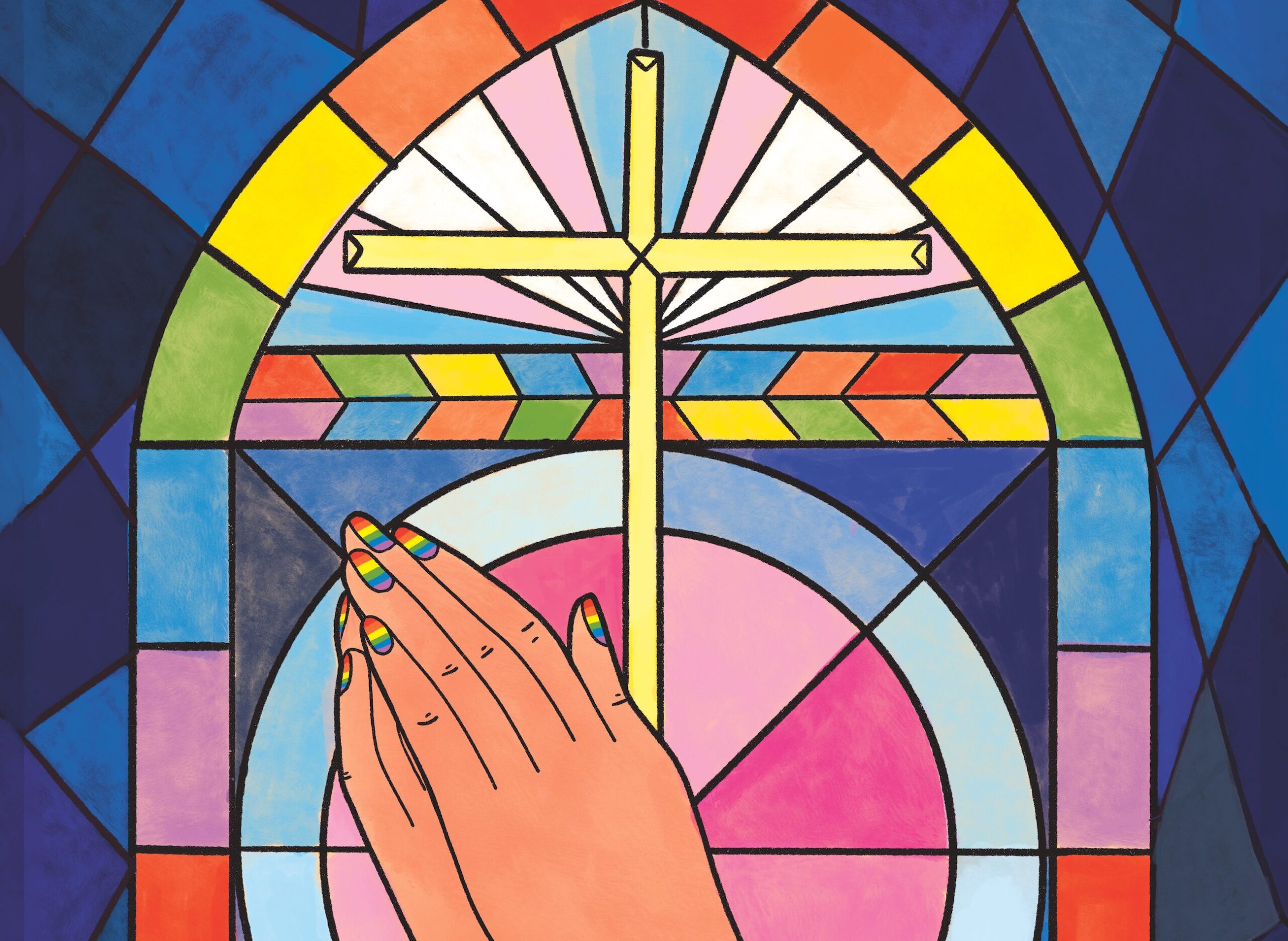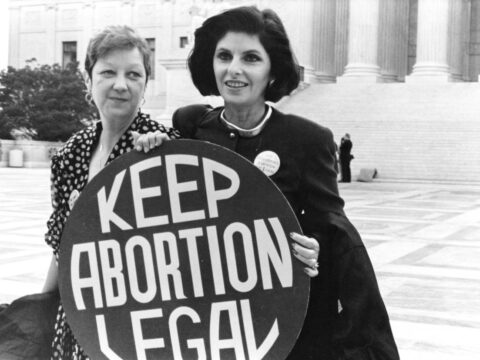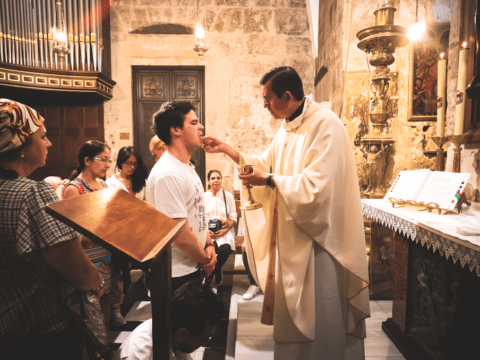“All are welcome.” That’s the phrase displayed on the sign out front at Lorne Park Baptist Church in Mississauga, Ont. It’s the phrase found in its weekly bulletin, and it’s the phrase Junia Joplin, 41, preached for six years as the lead pastor. But when Joplin came out as transgender during a sermon this past June and was later terminated, it was clear to her that those words were hollow. “Any church can say, ‘All are welcome,’ and it’s a totally meaningless and empty phrase,” she says. “It’s dishonest in a way that actually harms marginalized people.”
Even as an increasing number of denominations grapple toward full inclusion and acceptance of LGBTQ2 people, evangelical, Pentecostal and many other non-denominational churches continue to preach that being gay is a sin, a lifestyle choice that can be changed. For decades, church members who didn’t fit the heteronormative roles prescribed from the pulpit have felt traumatized. But times are changing, and some conservative churches are being nudged along, too.
The younger generations now coming into leadership roles at these churches grew up in a world that was more accepting of the LGBTQ2 community. Some emerging pastors, ministers and other leaders want to create spaces that truly welcome and fully accept those once cast as sinners. But they are struggling against the old guard, discovering such “radical” change and acceptance isn’t easily won.
Joplin grew up in Hudson, a town in North Carolina with a population of 3,700. She and her family attended the Baptist church adjacent to her grandparents’ property. The church, as she puts it, “proudly identified as fundamentalist.” Joplin says she felt called to ministry at around 11 years old, which was the same time her feelings that she should be a girl were at their most intense. At the time, she thought these two feelings were in direct competition with one another. “I could go to my parents and my church and say, ‘I feel called to ministry,’ and I’d be affirmed and celebrated and given opportunities,” Joplin says. “But if I’d said, ‘You know, I think I was supposed to be a girl,’ I would have been chastised, ostracized, maybe even abused.”
And so she repressed who she was, distracting herself with school, seminary and building a family and career. In 2014, she took the opportunity to transfer from a small church in Virginia to a larger congregation in Lorne Park, a community within the city of Mississauga. “I guess it was one of those moves that people make and they think, ‘Oh, this is gonna straighten my life out,’” she says. “I guess I recognized that there was something still missing.”

Joplin credits Canada with helping her learn who she really is. She was managing one of her son’s hockey teams, and Hockey Canada requires parent volunteers to take a webinar on non-discrimination and creating a safe and respectful environment for LGBTQ2 kids. There was a specific module addressing gender identity and expression that triggered a recognition. “I think I need[ed] to hear this calling within me that I’ve been persistently repressing and ignoring and doubting the existence of for, at that point, almost 40 years,” she says.
The night before delivering her sermon, Joplin was terrified. She didn’t get much sleep, but she was hopeful her congregants would embrace her true identity. Lorne Park Baptist is a member of the Canadian Baptists of Ontario and Quebec, which partners with the Evangelical Fellowship of Canada. She recalls the church had embraced a summer camp director when he came out as gay several years ago. Unfortunately, the congregation didn’t extend the same welcome to Joplin.
A month after her sermon, Lorne Park put Joplin’s job to a vote in the congregation. Of the 111 members who cast a ballot, 52 percent favoured her termination. “Frankly, I’m shocked to learn that my congregation would say ‘for theological reasons’ they would be dismissing me, because it doesn’t reflect the theology I’ve been hearing from folks,” Joplin says. “It doesn’t reflect the theology I’ve been preaching from the pulpit for six years.”
This dissonance is not unique. Many evangelical and non-denominational churches claim to embrace people from all walks of life, but when you dig into their websites, you might discover phrasing that indicates they don’t support same-sex marriage — an indicator that they don’t embrace the LGBTQ2 community. “Churches intentionally aim to be as unclear as they possibly can because nobody wants to come right out and say what they believe about this stuff, because I think they would see it is detrimental,” Joplin says.
She refers to LGBTQ2 people she knows who attend some of the megachurches in the Toronto area, not realizing that these churches are theologically not accepting of who they are. She feels the churches tend to avoid or skirt around the topic. “Neutrality is oppression,” Joplin says.
She credits the work of Black Lives Matter protesters for teaching people that it’s not enough to be neutral. “The opposite of racism is not not-racism: that is a neutral position. It’s anti-racism. And I would say the same thing for homophobia and transphobia.”
Of a similar mind is Jenna Tenn-Yuk, a Toronto writer and speaker who is a racialized, queer Christian. Tenn-Yuk was raised in the Pentecostal church, where fire and brimstone rhetoric was the norm. From early on, she was aware that being gay was considered wrong. She felt guilt and shame before she had the words for it. “Even if it’s who you are and it’s natural to you, you’re being taught that it’s unnatural,” she says.
Tenn-Yuk didn’t come out until she was in her 20s, telling some friends and family first and then writing a blog post. It was 2012 and she was working as an intern in a non-denominational Christian ministry. At the time, Tenn-Yuk says she was having terrible thoughts and was afraid she would hurt herself if she didn’t tell anyone. She found it healing to come out, but the Christian organization she worked at asked her to sign an agreement that she wouldn’t engage in homosexual behaviour. She felt like she was being asked to choose between her faith and her queerness. “You can be queer and Christian,” she says. “It doesn’t have to be this gut-wrenching decision.”
Tenn-Yuk has spent years looking for accepting churches that offer the familiar charismatic worship she grew up with. “I have a hard time with hipster churches….The pastors are tatted up, very stylish and trendy,” she says. “And so you have these ‘cool Christians’ who come off as liberal and progressive and yet are just as homophobic and transphobic as the old-school evangelical church.”
Tenn-Yuk finds this far scarier because what you see isn’t what you get. “There will never be a sermon about how awesome it is to be queer,” she points out. She wants queer and trans folks to be celebrated in those spaces, and to see herself reflected in the leadership. Changes are happening incrementally, she says, but when you are being excluded, it doesn’t feel fast enough.
“Why not create a space of our own that can hopefully create spots of healing right now?”
Evangelicalism is a broad category of Christianity that falls within Protestantism. The emphasis is on a personal relationship with Jesus Christ and a literal interpretation of the Bible as the true word of God, which evangelicals believe in sharing to win souls for Jesus. While a large number of those who attend these types of churches in the United States call themselves evangelicals, Canadians seem to prefer the term “non-denominational,” meaning they don’t fall under the umbrella of other denominational institutions, such as the Anglican, Presbyterian or United churches.
However, numerous denominations within Canada do identify as evangelical, including Baptist, Brethren, Congregational, Lutheran, Pentecostal and the Salvation Army. According to the Evangelical Fellowship of Canada (EFC) website, eight to 12 percent of Canadians refer to themselves as evangelical. (Broadview asked the EFC for comment on this story, but the organization declined.)
One of the tenets of evangelicalism is the idea that the Bible says marriage can only take place between a man and a woman and that sexual activity outside of marriage is forbidden by God. “It was a very, very clear message that homosexuality was an abomination, and that meant hell,” Dev Cuny, a non-binary activist and ambassador of the #BornPerfect Campaign to End Conversion Therapy, told CBC.
Cuny grew up in a charismatic evangelical church and believes there will always be a loyal percentage of evangelicals who are anti-gay, but Cuny has seen a shift in attitudes toward accepting the LGBTQ2 community among younger evangelicals. “The more knowledge and education people [have],” they say, “the more people realize there’s nothing harmful [about being LGBTQ2].”
Research by Ryan Burge, a pastor and associate professor of political science at Eastern Illinois University, backs up Cuny’s observation. Burge is interested in the intersection of religiosity and political behaviour, especially among evangelicals. He spends a lot of his time poring over statistics culled from the General Social Survey (GSS) in the United States and creating graphs so people can visualize shifting views from different religions over time.
Burge looked at data from the GSS regarding evangelical Americans’ acceptance of same-sex marriage over the last 15 years, divided into two age ranges: 18 to 35 and over 35. (Similar data broken down by age doesn’t exist for Canada.) In 2004, 20 percent of the younger age group was in favour, whereas 6.5 percent over 35 were in favour. The most recent numbers from 2018 show that 55.9 percent of young evangelicals are in favour of same-sex marriage, compared to 42 percent of those over 35. Burge was blown away by these results; the speed at which attitudes had shifted was unlike anything he had seen.
Given that this opinion is in direct opposition to what’s often taught in their churches, young evangelicals have an opportunity to bring about a reckoning, or at least start challenging these long-held beliefs. “I think those kind of conversations are going to be happening more and more,” Burge says, “as these churches try to figure out how much they can move away from their traditional views, because membership growth is the number one operative condition for them.”
Adam Phillips, 40, is one of those young evangelicals pushing against the church’s traditional beliefs. He conceived of Christ Church: Portland in his living room in 2013, during a Bible study about the Sermon on the Mount. “We talked about being salt and light in the world,” he says, “and we talked about this idea that Jesus taught us that God is radical inclusion and care for the people and the planet.” To Phillips, that meant embracing those on the margins of society, including LGBTQ2 people.
To progressive Canadians, this might sound like an obvious idea, but to many in the evangelical world, it was revolutionary. Phillips says he wasn’t taught about LGBTQ2 inclusion when he was growing up in the Evangelical Covenant Church (ECC), one of the largest evangelical denominations in North America. “There would often be really toxic jokes from the pulpit,” he says. “You know, ‘God didn’t create Adam and Steve.’”

When Phillips planted his church, the ECC provided much of the funding to get it off the ground. He thought he could advocate for change from within and didn’t realize the barriers for LGBTQ2 participation in the ECC were so high. About nine months into the start of the church, ECC leaders began pressuring Phillips, telling him he wasn’t allowed to include LGBTQ2 people in any leadership roles, including music ministry, children’s ministry and the board.
Phillips pushed back. He and his leadership team were unwilling to exclude the LGBTQ2 community at any level. They were at an impasse. In 2015, the ECC cut both religious and financial ties with Christ Church: Portland. “To have our funding cut off, to have our mentors and coaches and leaders shun us, was devastating,” says Phillips. (The ECC declined Broadview’s request for comment.)
Phillips held a series of meetings with his church’s leaders to determine their fate, and they decided to keep going. At the time, about 25 congregants attended Christ Church. Within five years, they had grown to more than 200, including members of the LGBTQ2 community. “That’s the thing that I think is often forgotten,” Phillips says. “This is a community that is desperate to serve Christ.”
Sadly, the COVID-19 pandemic wiped out the already dwindling funds keeping Christ Church: Portland operating. On July 1, Phillips delivered his last sermon, and the church closed its doors for good. He remains unsure what the future will bring, but he is hopeful. He believes that what the congregation tried to do is “on the frontier of what is coming in the church.”
Anecdotally, Phillips’ experience isn’t unique. Some leaders have a vision for an inclusive church, but those who hold the purse strings are not willing to bend on the LGBTQ2 issue. Losing funding from the more conservative bodies that oversee these churches and the more traditional members who tithe is a significant threat, so some are choosing a different path.
When Aaron Bailey, 43, a gay entrepreneur, discovered Highlands Church in Denver, he says it profoundly changed his life. Highlands is progressive with a worship style rooted in evangelical traditions. “The ability to worship along- side young and old, gay and straight, lesbian families, trans individuals, and to be completely accepted for who I was…it was remarkable,” he says.
Bailey wasn’t alone in his recognition of the unique house of worship. As he volunteered more for Highlands, he would take phone calls from people asking where they could find a similar church in their own city. “I started noticing that what I had at Highlands in Denver, Colo., wasn’t possible for my LGBTQ siblings in Omaha, [Neb.], or Michigan or Atlanta.”
More on Broadview:
- Nora Sanders on her faith, challenges and hopes for the United Church
- United churches need to examine their whiteness: workshop leader
- LGBT Christians push to overturn Young Life’s ‘sexual conduct’ policy
After successfully selling his first business, Bailey realized he had the background that could help fix this problem, and soon developed Launchpad — a non-profit organization that helps plant LGBTQ2-affirming churches in the United States. “There’s a lot of interest out there in starting churches,” he says of Launchpad’s mentoring program, “but very few people know how to go about doing that, or they don’t know they have the permission to do that.”
The organization, which formed in 2019, is still in its infancy, but Bailey says they are working with about a dozen would-be churches in various capacities, and another couple of dozen groups are considering the idea of planting a church with their help. “We’re working with all sorts of churches and faith communities,” Bailey wrote in a text, “from post-evangelical churches to some mainline churches and purely online communities.”
Some young Christians are even creating entirely new communities outside the structures of a church. Kelly Ravenscraft, 24, grew up in a wide range of Christian communities, mostly within the evangelical tradition, and felt called to work in ministry. But what she was teaching and being taught was at odds with who she was. She felt a deep desperation to see spaces “where I could exist fully as myself as both Christian and gay and the long list of other identities that I hold.”
Ravenscraft and fellow worship leader Michael McBride created Affirming Worship in Chicago in March 2019. They say that they aren’t a church because that word continues to be associated with pain: they are more of a healing faith community with an open-ended worship format, and they operate out of a gay bar. “We recognize that walking into a space that even looks like a church can still be triggering for a lot of folks and can become a barrier,” says Ravenscraft.
She explains that people are working on the systemic changes needed in evangelical churches to make them welcoming to LGBTQ2 worshippers, but Affirming Worship is here to support the current needs of her community. “Why not create a space of our own that can hopefully create spots of healing right now?” she asks.
Healing is exactly what Junia Joplin was looking to do when she delivered her coming-out sermon. She remembers that as she was writing it, she thought about that 11-year-old closeted trans girl who just couldn’t figure out who she was, and whose church wouldn’t have a place for her if she did. That was who she wrote her sermon for.
Part of Joplin’s motivation to speak her truth now was a recent study that came out in the American Journal of Preventive Medicine. It found that the more important religion is to LGBTQ2 youth, the more likely they are to experience suicidal thoughts.
“I can’t let the church keep doing that,” she says. “I want to speak into that situation. For that kid that might be thinking, because of what their pastor said, ‘I’m broken and I’m wrong and I don’t deserve to continue to be alive,’ I want her just to hear a pastor say, ‘God loves you and calls you by name and created you fearfully and wonderfully. You are beloved.’ That message saves people.”
CORRECTION: A previous version of this story stated that Jenna Tenn-Yuk was working at a church when she came out. This version has been corrected.
This story first appeared in Broadview’s November 2020 issue with the title “Evangelical rift.”
Glynis Ratcliffe is Broadview’s senior writer.
We hope you found this Broadview article engaging.
Our team is working hard to bring you more independent, award-winning journalism. But Broadview is a nonprofit and these are tough times for magazines. Please consider supporting our work. There are a number of ways to do so:
- Subscribe to our magazine and you’ll receive intelligent, timely stories and perspectives delivered to your home 10 times a year.
- Donate to our Friends Fund.
- Give the gift of Broadview to someone special in your life and make a difference!
Thank you for being such wonderful readers.
Jocelyn Bell
Editor/Publisher
















First, A church can be welcoming, but it does not have to affirm anyone who is contrary to God’s Word. God’s family is NOT all inclusive, there are “family” boundaries and rules set by God’s Word. It is up to the church body to define who worships with them or not. This definition may come from within the congregation or the denomination itself. In the above case who changed the boundaries? The church or Joplin?
As a congregation they can accept you for who you are, but cannot be encouraged to continue in sin Much the same for an alcoholic, a gossiper or someone heavily into pornography. Unfortunately we as fallen creatures have separated sins into categories and levels and will tolerate some sin more than others. Once that happens, we tend to accept every sin as normal. (Remember this is deliberate unrepentant sin – yes, we all sin)
The CBOQ has this as part of their statement of faith “8.2.1 Christian marriage is union in Christ whereby a man and a woman become one in the sight of God. It is a commitment of two people to love and to support each other faithfully for life. God’s law forbids adultery. Marriage thrives in the soil of loyalty and blossoms under the light of kindness. Sexual union in marriage is intended to provide mutual joy and comfort as well as the means of creating new life.” What made her think that statement didn’t apply to her? (Unfortunately the denominational stance on homosexuality is not clear, only implied.)
Her Pastoral conduct under the BCOQ (which I assume she signed) states: “Maintain a God-honouring and pure sexuality. I will not engage in extramarital, pre-marital, or same-sex sexual relationships or behaviour in keeping with This We Believe: Resources for Faith with Baptist Distinctives 7 and the Resolution on Same-Sex Marriage 8 . I will avoid pornography 9 (Mark 7: 21- 23; 1 Corinthians 6:
18- 20; Galatians 5:16- 26; 1 Thessalonians 4: 3- 8).”
Emergent churches are not viewed by evangelical churches as the next generation either (Read: https://carm.org/what-emerging-church ) Because some churches are accepting the concept of LGBQT ideals, doesn’t make them right.
The quote, “She feels the churches tend to avoid or skirt around the topic.” Unfortunately, society and laws make it extremely difficult to address the issue within the church. You’re danged if you do and danged if you don’t.
Tenn-Yuk finds this far scarier because what you see isn’t what you get. “There will never be a sermon about how awesome it is to be queer,” she points out.
I’ve yet to see a Biblical passage to support that type of sermon.
“The more knowledge and education people [have],” they say, “the more people realize there’s nothing harmful [about being LGBTQ2].” This assertion is false, (I hate using other material but I’m limited in space here) See: https://carm.org/is-homosexuality-dangerous
Burge says, “as these churches try to figure out how much they can move away from their traditional views, because membership growth is the number one operative condition for them.” If your church stands on it’s convictions and holds the ‘Word of God’ true – membership size means nothing. However, “Heaven and earth shall pass away, but my words shall not pass away” no matter what society forces, God’s Word stands.
Adam Phillips, like Joplin didn’t read or understand his denominational distinctive, The ECC holds celibacy in singleness and faithfulness in heterosexual marriage to be the behavioral standard for all Covenant clergy. The ECC does not credential people who are in violation of this standard. (See ECC website: Guidelines for Covenant Pastors and Congregations Regarding Human Sexuality) Why are these people surprised when they circumvent policies?
“It found that the more important religion is to LGBTQ2 youth, the more likely they are to experience suicidal thoughts.” I realize I’ll be hated for this… Has anyone come to the conclusion that perhaps Satanic forces are behind this? We are slaves to sin. There is no existence in the world so sad as that of a slave; and there is no slavery so hard as that of sin, no taskmaster so bitter as the devil.
It is for freedom that Christ has set us free. Stand firm, then, and do not let yourselves be burdened again by a yoke of slavery.
“Love one another as I have loved you.” He lived that in relation to Mary Magdelene. Of Course that is nonsense ???????
You also forgot “Go and sin no more” John 5 & 8.
With forgiveness comes the expectation that we will not continue in the same path of rebelliousness. Those who know God’s love will naturally want to obey Him.
I am Old Guard. Speaking to LGBT, please start your own place of worship. Why ruin ours, like you did to some other denominations. If you come in, I go out. Our leadership should see that.
LGBT didn’t ruin anything; that’s an impossibility within the structure of the church. The people of the church in their attitudes ruined the church. in their failure to “love one another” as they protected their images thus creating ruin i the hostility.
WHAT TO SAY ?? I tear as I read this article. God is LOVE; we are to LOVE one another. Now abideth Faith, Hope & LOVE but the greatest of these is LOVE. God created ALL things we say; Love one another as…” A close friend was not accepted in ministry of the Baptist church, she was a woman; she entered the ministry of the United Church & was n amazing blessing to the churches she served. In the Churches early life Gnostics were cast out; 6 months ago a senior minister in a study group shared an ugly story of the basest acts re. Gnostics. The Gospel of Mary & the Gospel of Thomas, both Gnostic writings are beautiful books & reflect fully the message of the Gospel of John & St Paul in1 Cor.: 13.
I attended a Unitarian church for over a year & talked with a person who was transgender; ONE other person regularly spoke with her/him; the choir on LGBTGYFKL day dressed as normal in black & ignored the colourful they put on on other occasions.
As a Pastor in my retirement from teaching, I always ran into rejection because I did not preach the “retributive justice” of the O.T.
but focused, always on Jesus’ “Distributive Justice” of LOVE. that heals & builds.
I HATE the word QUEER as NO one is queer- just another person with a different relation awareness than mine soooo??
WE do need to refind that old old message that we’re ALL children of God with that LOVE as part of our being. The world & church is dying for it. My Dad died for it within a torn church.
We are all created in God’s image, but we are not all children of God. “But to all who did receive him [Jesus], who believed in his name, he gave the right to become children of God, who were born, not of blood nor of the will of the flesh nor of the will of man, but of God”. Funny, in that passage, we can’t even will ourselves to be God’s children. It is a Spiritual rebirth that we need to experience to become children of God. The world and the church need to die to sin, not from a humanistic view of Christ.
Pride and Prejudice is a nice book to read, but we don’t include that in Scriptures. (or do we need to add The Gospel according to John Bunyan to the Bible?). Good reads do not make Biblical writings. As for your friend in the United church, a witch doctor cannot be in the Canadian Medical Association, no matter how well they can cure people. God created guidelines for the role of women, I don’t like them either, but man did not create the guidelines.
Love is not part of our being, if it were so, Christ wouldn’t have need to tell us to love one another. The world and the church is dying because of sin. The world hates Christ
Gary, for their sake I hope you never have a child, grandchild, sibling or parent who identifies as LGBTQ+; for your sake I hope you do. Why do people insist on putting limits on God’s love? If the church you belong to can’t allow people to live and love in whatever gender identity and sexual orientation God has made them, please suggest to them that there are denominations which can and will support their spiritual growth. (If you are from Canada many – I’d like to say all- United Churches would welcome them.)
You might read ‘ God’s Secretaries the Making of the King James Bible ‘ and perhaps you will be enlightened how the context and the authors influenced the making of the KJV. There was a lot of compromise and ‘making the king happy’ that went into the text.
(And just a note about your comments in response to the article – being long, loud and aggressive doesn’t bring people to Jesus if that is what you are trying to do. )
Proverbs 22:6 – Train up a child in the way he should go, And even when he is old he will not depart from it.
There is no limit in God’s love, and I never put a limit on His love.
God HATES sin. All have sinned and fall short of the glory of God. (Not my words – God’s inspired Word). God is Holy, we are not, so we have done something to separate ourselves from God. God fixed that by sending Jesus to DIE on the cross, because sin can only be reconciled by blood. (Still God’s Word not mine).
God does not make people gay, or confused genders, it is a result of sin. If God made people that way, He would not have made Levitical laws against it. He would not have inspired the New Testament writers to write against it. I would never suggest to someone to go to a church that changes or denies God’s Word to please the culture they are in. (News Flash – not all United Churches welcome LGTBQ’s, perhaps a majority. Some may say they welcome them on paper but…)
I’ll take the time to read the book you’ve suggested, but KJV is called “Authorized” because the Anglican Church approved it as such, not because it’s the final authority of God. Many documents and sources have been revealed since 1611, and newer versions are not making “kings” happy, yet they still reveal God’s intent. Today’s New International Version (2001) has the same word meanings in Romans 1 and Leviticus 18.
It was a long, loud article about inclusion and why churches should accept rebellious sin to flourish in their congregation. Consider my comments as a rebuttal. Jeremiah 6:10